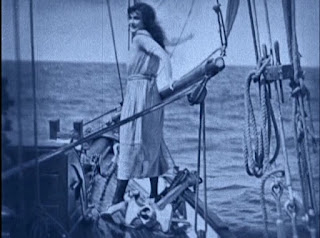What was King Vidor's agenda? Raymond Durgnat and Scott Simmon make much of the director’s Christian Science background in their book King Vidor, American; his work the result of a constant struggle between the films he wanted to make and the need to produce popular product.
Wild Oranges (1924), like The Sky Pilot (1922) may well be one of those films were he smuggled in more meaning than was apparent to his paymasters at Goldwyn Pictures – something which pointed the way to more philosophical fare such as The Big Parade and, especially, The Crowd.
 |
| Frank Mayo |
  |
| The music of chance... |
Her husband rushes top his wife’s aid but it’s too late: she is gone… just like that leaving a hole in her husband’s heart he never expects to fill again.
  |
| Two men and a boat |
On to a Georgian shoreline well off the beaten track and with a tricky approach over fast moving shallow waters: the perfect place to get lost and the perfect place to run aground…
So far so sad but what awaits is something else… An old man (Nigel De Brulier), looks on in rising panic, a victim of congenital anxiety but still shell-shocked by the civil war fought two generations before.
  |
| The locals spy the unwanted visitors |
From the boat, John spies a woman swimming and it turns out not to be Delores del Rio taking an early dip but Virginia Valli… John looks on through binoculars and no doubt reminds himself of his vow to keep on moving.
 |
| Vidor was an advocate of the filming of wild swimming |
He meets Millie (Virginia Valli) – the old man of the house’s granddaughter – who whilst she has inherited his timidity still has a clear and open mind: she can grow beyond the confines of the twisted plantation perhaps.
She and John talk and she reveals that she’s never left their land even though she’s read of the wider world… there’s a spark between the two and one that unsettles both John and the watching Iscah.
The next morning Iscah plays a mean game with Millie carrying her to the swamp where he perches her on a tree stump surrounded by alligators: he won’t release her until she agrees to a kiss. His only hold on her is through fear and the physical dominance he exerts.
  |
| Insert snappy caption here |
Meanwhile Millie is lured by the promise of John’s boat and rows out for a trip which both thrills and then unnerves her… something had tied her to this land and she won’t easily be cut free.
 |
| Free all at sea |
But things are coming to a head and it’s not just Iscah who is losing his; John is getting too close to Millie and needs to make his escape. He cannot be unfaithful to the memory of his wife and he fears for the unlimited pain that the commitment of love can bring…
He points the yacht out to sea and looks to be on his way but as he steers in the dark he has visions of Millie; their potential happiness calling him back…
Meanwhile life is getting a whole lot more uncomfortable for Millie as Iscah proposes in his terrifying way and she only narrowly escapes his assault by blockading herself in her room… All is set for a mighty conflagration and, without giving anything away, Vidor sets up one of the most exhausting and convincing fights to the death you’ll see in silent film… it’s desperate stuff as every man, woman and dog are taken to the limits.
 |
| "Don't get me started..." "You can start anytime..." |
John W. Boyle’s cinematography helps to capture this feel whilst Vidor and his editors keep the action at Southern Gothic pace – I was reminded of Mary Pickford’s superb Sparrows from 1926 which is a better film but who knows, Miss P may have seen this one?
I watched the Warner Archives DVD which comes with a splendid new score from Vivek Maddala which moves well with the storyline without overwhelming it as orchestral updates can sometimes do. Maddala’s pacing is bang on and really does catch the southern climes, the eerie warmth of the breeze and the fragrance of those bitter-sweet wild oranges.
The disc is available direct from the WB Shop or from Amazon.
















No comments:
Post a Comment